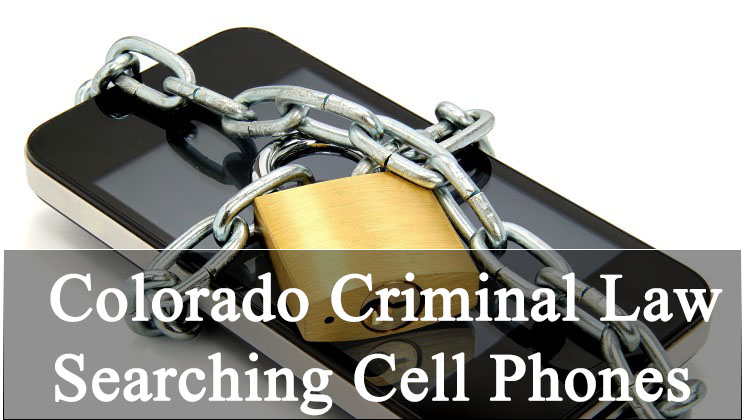




Jan 29
Colorado Criminal Law – Searching Cell Phones – Limits On Search Warrants

By H. Michael Steinberg Colorado Sex Crimes Criminal Defense Lawyer – Attorney
Colorado Criminal Law – Searching Cell Phones – Limits On Search Warrants – In Colorado sex crime case investigations it is common for the police to seize a cell phone and attempt to search that cell phone with a search warrant. This article examines the use of a cell phone search warrant as that procedure was reviewed in a recent decision by the Colorado Supreme Court.
In the case of People v. Herrera, Herrera was charged with one count of sexual assault on a child – §18-3-405(1), C.R.S., one count of internet sexual exploitation of a child – §18-3-405.4(1), C.R.S., and one count of internet luring of a child – §18-3-306(1), (3), C.R.S..
In this type of case, the police will seek, and usually obtain, a search warrant of the suspect’s cell phone. The intent is to try to locate and seize as evidence direct communications between an alleged victim and a defendant charged with, for example to prove:
“…enticing through . . . a text message or instant message, a person whom the actor knows or believes to be under fifteen years of age.” § 18-3-405.4(1).
Quick Aside – How The Police Conduct A Search Of A Seized Cell Phone
The police typically use an instrument called a Cellebrite Device to search the memory of the phone and to download certain data—for instance, text messages and internet history.
“The Cellebrite Universal Memory Exchanger (UME) is a standalone phone-to-phone memory transfer and backup machine. It transfers all forms of content, including pictures, videos, ringtones, SMS, and phone book contact data.”
Understanding The Law Of Cell Phone Searches – Some Foundational Colorado Search And Seizure Constitutional Law
The Warrant Clause of the Fourth Amendment requires that a search warrant must “particularly describe the place to be searched, and the persons or things to be seized.” U.S. Const. amend. IV.
This “particularity” requirement is designed to “prevent officers from conducting a ‘general, exploratory rummaging in a person’s belongings.” ‘General Warrants’ and ‘writs of assistance’ were reviled in the colonial era. General warrants allowed British officers to rummage through homes in an unrestrained search for evidence of criminal activity.
The Fourth Amendment therefore requires that law enforcement officers specifically describe – in the search warrants they seek – what they are looking for and where they will find it. This is to prevent “indiscriminate[ly] rummaging through citizens’ personal effects.”
In Herrera – The Officer Went Beyond The Warrant’s Limitations
The Search Warrant for Herrera’s cell phone permitted a search of the phone for:
(1) texts sent between Herrera and “Stazi” (the undercover police officer),
(2) photographs sent between Herrera and “Stazi” that were attached to text messages, and
(3) indicia of ownership to show the phone belonged to Herrera.
As noted, in the Herrerra case the search warrant permitted the police to search Matthew Herrera’s cellphone for indicia of ownership however the warrant did NOT permit a search every folder in the phone for indicia of ownership.
Furthermore while the warrant authorized a search for text messages between Herrera and “Stazi” (the undercover police officer posing as a juvenile girl) it did NOT permit the unlimited intrusion into all of the folders on the cellphone.
The Detective admitted under oath that her went beyond the scope of the search warrant and while the Detective searching the cell phone clearly went beyond the specific limitations of the warrant he argued that his “discovery” of the hidden folder was in “plain view” as he searched the cellphone.
Let’s look at the strength of his argument which relies on the Plain View Exception to the Fourth Amendment’s search warrant requirement.
An Alternative To Specific Search Warrants – The Plain View Exception
The State argued in Herrera that even if the officer’s search of the cell phone exceeded the specific limits of the warrant, under the plain view exception, the search and seizure of the information was admissible at trial.
To meet the plain view exception, three requirements must be met:
(1) the government’s initial intrusion must be legitimate,
(2) the incriminating nature of the evidence must be immediately apparent, and
(3) the government must have the right to lawfully access the object.
The Herrera Court rejected the argument that the hidden folder’s texts were obtained under the search warrant’s authorization to search for “indicia of ownership” of the cellphone and that under the warrant to search the entire contents of the phone because every text contained in the phone had the possibility of identifying Herrera as the owner of the phone
The Herrera Court then found that since the search violated the limitations of the search warrant the search also failed the “Plan B” argument under the plain view exception. The Court held that the third requirement of the plain view exception had not been met – specifically, that the police did NOT have lawful access to that folder’s contents because there was “no objective basis for the police to believe that it would contain messages from the undercover officer and that a search of that folder was the same violation as searching a closed container:
The “Faith Fallout” folder was essentially a separate, closed container filled with text messages from a particular number. Under the warrant, Detective Slattery could search containers that might reasonably contain messages from “Stazi.”
As the trial court found, however, messages from “Stazi” could not have reasonably been found in the “Faith Fallout” folder, as the circumstances indicated that that folder likely contained communications with Faith W., not “Stazi,” and there was no suggestion that Herrera had deceptively labeled his files to conceal evidence.
We agree with the trial court and accordingly affirm the suppression order.
Don’t Rush To Believe That This Case Is A Broad Rejection Of Cellphone Searches
It is important to note that Herrera may be limited to it’s facts. The Courts have also held that because defendants can easily conceal the identity of contraband by mislabeling a container – searching closed containers may be justified…
“Few people keep documents of their criminal transactions in a folder marked ‘drug records.
“A search of computer files “can not be limited to reviewing only the files’ designation or labeling, because the designation or labeling of files on a computer can easily be manipulated to hide their substance.”
The Herrera case was distinguishable because the State did not present ANY evidence to suggest that the Defendant attempted to manipulate or otherwise deceptively name his folders or to hide their substance. They were what they appeared to be – labeled with the name of the Defendant’s alleged victim.
If we were to hold that any text message folder could be searched because of the abstract possibility that it might have been deceptively labeled, we would again be faced with a limitless search.
Colorado criminal defense lawyers should not read too much into the holding in Herrera.
What is important here factually is the messages of the alleged victim were outside the scope of the search warrant because the warrant was too narrowly-drawn. THAT is why they could not be used and were suppressed.
Next time – the officers may consult a seasoned District Attorney who will draft a search warrant in such a way as to broaden the search to permit viewing the kind of folders prohibited from the eyes of the Detective in Herrera. By including language to include communications of a sexual nature between Herrera and any person who is or purports to be under the age of consent, this case would have turned out very differently.
Summary – The Cell Phone As A Vehicle For Privacy
The good news is this…the United States Supreme Court has recently recognized that cell phones are not just another technological convenience and they are unique in our modern lives.
“With all they contain and all they may reveal, they hold for many Americans ‘the privacies of life.’”
Colorado Criminal Law – Searching Cell Phones – Limits On Search Warrants
If you found any of the information I have provided on this web page article helpful please click my Plus+1 or the Share buttons for Twitter and Facebook below so that others may also find it.
The reader is admonished that Colorado criminal law, like criminal law in every state and at the Federal level, changes constantly. The article appearing above was accurate at the time it was drafted but it cannot account for changes occurring after it was uploaded.
If, after reading this article, you have questions about your case and would like to consider retaining our law firm, we invite you to contact us at the Steinberg Colorado Criminal Defense Law Firm – 303-627-7777.
Never stop fighting – never stop believing in yourself and your right to due process of law. You will not be alone in court, H. Michael will be at your side every step of the way – advocating for justice and the best possible result in your case. H. Michael Steinberg is passionate about criminal defense. His extensive knowledge and experience of Colorado Criminal Law gives him the edge you need to properly handle your case
 ABOUT THE AUTHOR: H. Michael Steinberg – Email The Author at [email protected] – A Denver Colorado Criminal Defense Lawyer – or call his office at 303-627-7777 during business hours – or call his cell if you cannot wait and need his immediate assistance – please call 720-220-2277.
ABOUT THE AUTHOR: H. Michael Steinberg – Email The Author at [email protected] – A Denver Colorado Criminal Defense Lawyer – or call his office at 303-627-7777 during business hours – or call his cell if you cannot wait and need his immediate assistance – please call 720-220-2277.
“A good criminal defense lawyer is someone who devotes themselves to their client’s case from beginning to end, always realizing that this case is the most important thing in that client’s life.”
You should be careful to make a responsible choice in selecting a Colorado Criminal Defense Lawyer. We encourage you to “vet” our firm. Over the last 40 plus years – by focusing ONLY on Colorado criminal law – H. Michael has had the necessary time to commit to the task of constantly updating himself on nearly every area of criminal law, to include Colorado criminal law and procedure and trial and courtroom practice. H. Michael works hard to get his clients the best possible results in and out of the courtroom. He has written, and continues to write, extensively on Colorado criminal law and he hopes this article helps you in some small way – Colorado Criminal Law – Searching Cell Phones – Limits On Search Warrants.
You Might Also Enjoy:
- Juveniles Given More Protection By 2012 Colorado Law
- Does A Colorado Criminal Defendant Have A Right To Search The Alleged Victim’s Home For Evidence Of Innocence?
- Colorado Ramps Up Child Pornography Investigations – Targets Internet Luring C.R.S.18-3-405.4/18-3-306 and Sexual Exploitation Of Children Cases
- Colorado Criminal Law – Defense Based Investigation – Retaining An Investigator – A Guidebook
- Colorado Sex Offender SOMB Standards Finally Reject No Known Cure Approach












